
Do you seek to live compassionately without the unnecessary exploitation of people, animals and the environment? Are you concerned about climate change and future generations? Are you interested in changing how we interact with other species, ecosystems and our human communities? Then our Vegan Permaculture Design Course developed by Graham Burnett, author of The Vegan Book of Permaculture and holder of the Diploma in Permaculture Design and others is for you!

Course Content
The course is adapted from the 72-hour international Permaculture Design Course syllabus and is accredited by the Permaculture Association (Britain). It covers universal permaculture ethics, principles and design methods. However please note the focus is on non-animal based and stock-free systems & alternatives to animal exploitation. Below is a short film from the first Vegan Permaculture Design Course to be held in the USA, a partnership venture with Spiralseed and Wild Earth Farm and Sanctuary in Irvine, Kentucky.
The broad curriculum introduces all aspects of regenerative design and living in a participatory & enlivening way through group work, design practice, practicals & site visits. Areas of learning include the permaculture design process, surveying skills, soils, stockfree food growing and kitchen gardening, understanding climate & microclimate, agroforestry, restoration agriculture & forest gardening, water in the landscape, regenerative economics, bioregionalism, community organising, systems thinking, sustainable building, energy & transport plus much more...
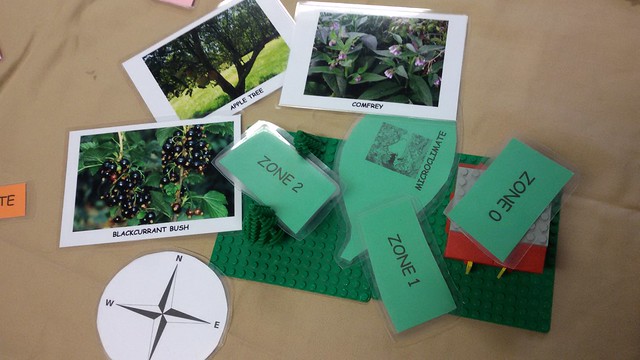
Empowerment is the essence of this Design Course, and practical and theoretical teaching methods are used to create an experience that is fun, lively & inclusive, using group work, discussion, observation, guided walks, 'hands on' practical activities, lectures, videos, and slides as learning methods during course sessions. Participants will also work together on applied design activities that will consolidate all of the learning content and empower students to take permaculture back into their own homes, gardens, lives & community, providing essential skills for thriving in the post-peak oil world.

Course participants will be awarded the Permaculture Association (Britain)'s internationally recognised Certificate in Permaculture Design (NB, to be awarded the certificate you must attend a minimum of 70% of the course and complete a group design presentation at the end of the course).

What is a Permaculture Design Course?
The Permaculture Design Course (PDC) is a vital stage in the development of understanding of permaculture ethics, principles, design processes and implementation techniques. We utilise Regenerative Learning principles and methods in order to empower the genius inside all of us to create positive design solutions for your life, your community and your world. To help you decide whether the PDC is for you, it might be a good idea to listen to What is a PDC? to get a sense of 'What is a Permaculture Design Course? and What isn’t a Permaculture Design Course?'.

How does the 'Vegan' Permaculture Design Course differ from any other PDC?
"The content of the specifically Vegan Permaculture Design Courses isn't hugely different from other PDCs I’ve taught. The focus is really on design skills - learning to see patterns in nature and in human and social contexts, plus giving us the tools and confidence to take responsibility for our lives and actions, in settings ranging from food production to ecological building to woodland management to ‘green’ economics to urban regeneration. Obviously, however, we would choose venues that are vegan-sympathetic, such as Wild Earth Animal Sanctuary in the USA, or Brook End in Somerset, and would focus on stock-free methods of soil regeneration such as using green manures and tree crops rather than examples or case studies that depend on livestock. Other than this participants can be confident that we are providing a ‘safe zone’, where they will not be criticised for their lifestyle choices, whether vegan or not. Feedback from our first course was that this aspect has been greatly valued, with one person telling us that they had previously had to leave a ‘conventional’ PDC halfway through, due to feeling judged and excluded for their vegan beliefs by fellow participants, and even by the tutor.

In addition we have created spaces on the course for discussions around the wider implications of ‘veganic permaculture’. For example, how do we dismantle and replace industrial and animal agriculture with systems that are life-sustaining and liberatory? Another theme that emerged was whether a vegan permaculture (vegaculture?) needs a ‘fourth ethic’ in addition to ‘Earth Care, People Care and Fair Shares’ - one of ‘Do Least Harm’. Is it enough to simply ‘care for’ our non-human fellow earth-citizens whilst our relationships with them continue to be exploitative, or should we actively promote their recognition as self-willed beings with an intrinsic right to exist free from unnecessary harm?

Not all permaculturists or permaculture projects are vegan, and I’ve often been asked whether a completely animal-free permaculture is even actually possible. My response is, of course not, and neither would it be desirable. For example, how would we fence out the earthworms that build our soil and maintain its fertility, or the bees that pollinate our fruit trees and vegetables, and why ever would we wish to? In fact, we actively design in features that are intended to attract wildlife: Ponds for frogs, toads and dragonflies, and flowering plants to bring in the ladybirds and hoverflies that keep populations of potential pests like slugs and aphids in check, and are essential to maintaining healthy productive ecosystems. What we don’t include are those ‘system components’ that we believe perpetuate exploitative relationships with our non-human earth co-citizens, such as pigs, goats and chickens, whose primary function is the production of meat, milk and eggs."
Graham Burnett interviewed in 'Growing Green International' magazine, summer 2015
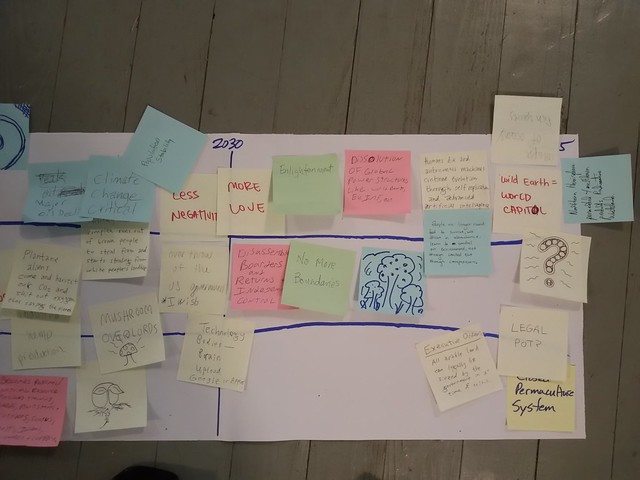
CLICK FOR CURRENT VEGAN PERMACULTURE COURSE LIST
Aims of the Course
- Introduce the basic concepts of systems thinking, holistic design and permaculture theory & practice.
- Introduce tools for making change happen in your own lives and places.
- Enable learners to integrate ecological & design thinking into their everyday lives.
- Introduce learners to existing examples of permaculture & relevant networks, and make them familiar with current development in the subject.
What we will cover
- Permaculture basics - Ethics, Principles, Design
- Thinking in Systems
- Understanding Natural Systems: Energy, Soil, Water, Ecosystems
- Understanding systems in the Human World, eg, in communities, organisations, economic systems, including stock-free growing systems, etc
- Design Practice & Group Projects
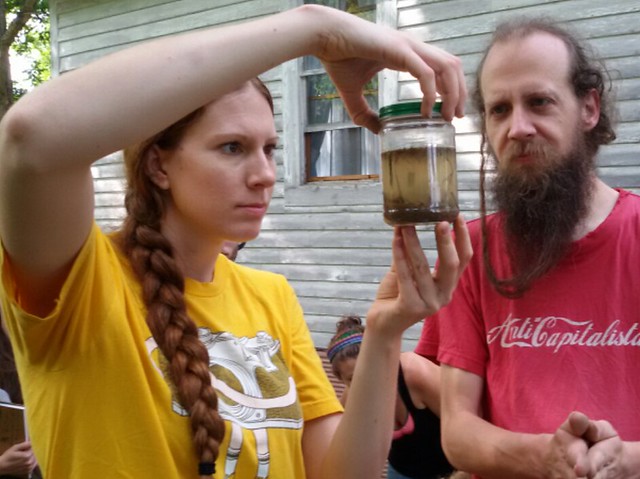
Learning Outcomes
After completing this course you will be able to:
- Apply permaculture ethics & principles to situations in your own life
- Describe the principles, processes & elements working within natural systems
- Describe the process of design & a variety of tools & methods within it
- Use design thinking in a variety of situations
- Apply what you've learned in your work and personal life, including your home, garden and community.
Teaching Methods & Learning Activities may include
- Guided discussions
- Work in small groups
- Practical activities & demonstrations
- Group & Individual Design Projects
- Presentation & Slide Shows
- Making a portfolio
- Site visits
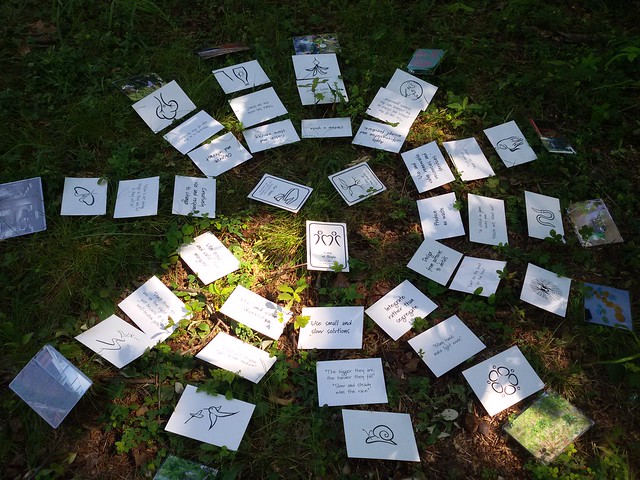
Course Dates & Locations
Click here for current list of upcoming Vegan Permaculture Courses
Vegan PDC Venues and Tutors
We have so far run highly popular Vegan PDCs at Brook End, a vegan organic smallholding in Somerset, England, Ici et Maintenant vegan permaculture project in Normanday, France, and at Wild Earth Farm and Sanctuary in Kentucky, USA. Tutors and instructors so far have included;
Graham Burnett
Graham has been teaching permaculture since 1998, is a holder of the Diploma in Permaculture Design and author of Permaculture A Beginner’s Guide and the Vegan Book of Permaculture. He runs Spiralseed, an ethical venture working in partnership with others who share concerns around social environmental justice. He has been vegetarian since 1977 and vegan since 1984.
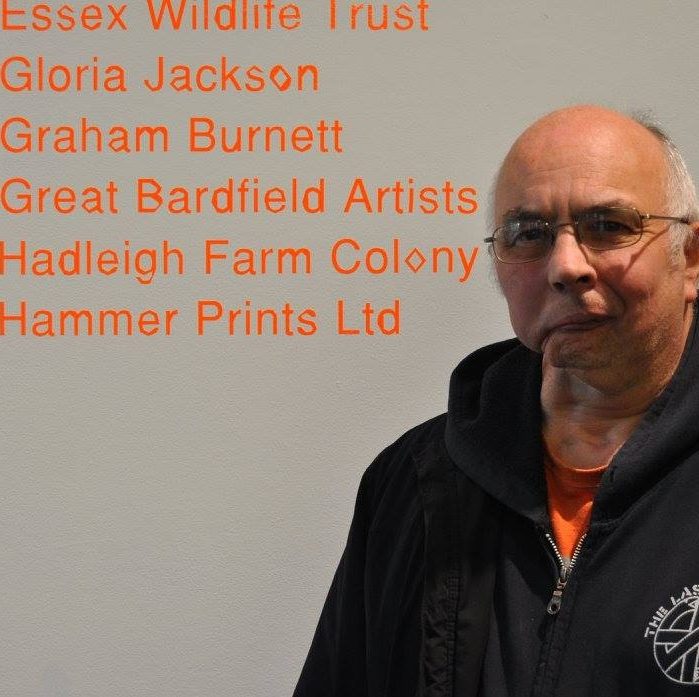
Nicole Vosper
Nicole is a vegan organic grower, agroecologist, community organiser and permaculture practitioner based in Somerset. She sees land-based struggle & living as an essential step towards animal liberation; "I have the west country in my bones and am blessed to share a four-acre family small holding called Brook End, which we have developed as a land based education centre. I never grew up with access to land and so my life is one big learning journey in how to live in relationship with the land again that we have historically and violently been displaced from."

William Faith
William is a long-standing activist in the fight for the rights of animals, care of the earth and social justice. He has given many presentations on permaculture at colleges, universities, eco/green fairs and festivals and private events, also giving several radio interviews on the subject.

Joe Kilcoyne
Joe received his permaculture design certificate from Midwest Permaculture located in Stelle, IL. He is co founder of Wild Earth Farm and Sanctuary. An avid outdoor adventurer who strives to build common ground and understanding between different walks of life. He believes that plants are a major part in this work to repair ourselves and the earth.

What folk have said about previous Spiralseed courses
"I can totally recommend this. I’ve done 2 courses under Graham’s tutelage and have thoroughly enjoyed each one. The second changed my life (for the better) and gave me the courage to ditch a a job that was wearing me down, in favour of self-employment that has left me happier than ever before as an adult. The Introduction to Permaculture course I did opened my eyes and broadened my outlook. Worth it for that alone, but when you add in a weekend of fun with like-minded people – priceless!"
"Graham's teaching style is open, non-ego, relaxed, positive and BRILLIANT - A natural educator, thank you!"
"If anyone is considering this course I would really recommend it"
"The course was terrific and was paced in such a way as to ensure maximum benefit"
"A wonderful weekend"
"I've done a lot of training courses and Graham is by far one of the best trainers I've had"
"I believe that we all left richer for the experience and, speaking for myself, happier and more hopeful. I am now just looking for an excuse to return, because the whole experience was just too good to have only once"
Can't afford the course fees? Have a look at some ideas here or fundraise for your tuition with We The Trees!



